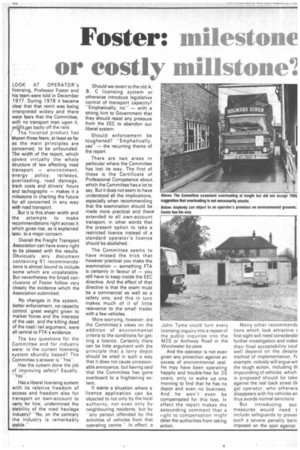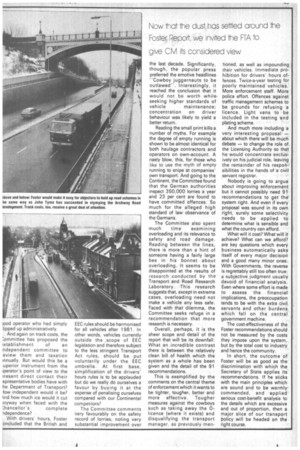Foster: milestone or costly millstone'?
Page 44

Page 45

If you've noticed an error in this article please click here to report it so we can fix it.
LOOK AT OPERATOR's licensing, Professor Foster and his team were told in December 1977. During 1978 it became clear that that remit was being interpreted widely and there were fears that the Committee, with no transport man upon it, might get badly off the rails.
,7 The finished product has 'shown those fears, at least as far as the main principles are concerned, to be unfounded. The width of the report, which covers virtually the whole structure of law affecting road transport — environment, energy policy, railways, overloading, road damage, track costs and drivers' hours arid tachographs — makes it a milestone in charting the future for all concerned in any way with road transport.
But it is this sheer width and the attempts to make recommendations right across it which gives rise, as is explained later, to a major concern.
Overall the Freight Transport Association can have every right to be pleased with the results. Obviously any document containing 91 recommendations is almost bound to include some which are unpalatable. But nevertheless the broad conclusions of Foster follow very closely the evidence which the Association submitted.
No changes in the system, better enforcement, no capacity control, great weight given to market forces and the interests of the user, and the killing dead of the road/rail argument, were all central to PTA's evidence.
The key questions for the Committee and for industry were: Is'the current licensing system sbundly based? The Committee's answer is "Yes".
Has the system done the job of improving safety? Equally. -Yes".
Has a liberal licensing system with its relative freedom of access and freedom also for transport on own-account to carry for hire, undermined the stability of the road haulage industry? "No, on the contrary the industry is remarkably stable." Should we revert to the old A, B, C licensing system or otherwise introduce legislative control of transport capacity? "Emphatically, no" — with a strong hint to Government that they should resist any pressure from the EEC to abandon our liberal system.
Should enforcement be toughened? "Emphatically, yes— the recurring theme of the report.
There are two areas in particular where the Committee has lost its way. The first of these is the Certificate of Professional Competence about. which the Committee has a lot to say. But it does not seem to have understood all the implications, especially when recommending that the examination should be made more practical and then/ extended to all own-account transport, in other words that the present option to take a restricted licence instead of a standard operator's licence should be abolished.
The Committee seems to have missed the trick that however practical you make the examination — something ETA is certainly in favour of — you still have to keep inside the EEC directive. And the effect of that directive is that the exam must be a commercial as well as a safety one, and this in turn makes much of it of little relevance to the small trader with a few vehicles.
More worrying, however, are the Committee's views on the addition of environmental criteria to the conditions for getting a licence. Certainly there can be little argument with the principle that a lorry depot should be sited in such a way that it does not cause unreasonable annoyance, but having said that the Committee has gone overboard to a frightening extent.
It wants a situation where a licence application can be objected to not only by the local authority, not even only by neighbouring residents, but by
"any person offended by the activities of vehicles from that operating centre.In effect, a John Tyme could turn every licensing inquiry into a repeat of the public inquiries into the. M25 or Archway Road or the Winchester by-pass.
And the operator is not even given any protection against an excess of environmental zeal. He may have been operating happiiy and trouble-free for 25 years, only to wake up one morning to find that he has no depot and even no business. And he won't even be compensated for this loss. In effect the report makes the astounding comment that a right to compensation might deter the authorities from taking action. Many other recommenth tions which look attractive first sight will need considerabl further investigation and indee their final acceptability coul well depend on the detaile method of implementation. Fc example, nobody will argue wit the tough action, including th impounding of vehicles. which is proposed should be take against the real back street ilk gal operator, who otherwis disappears with his vehicles an thus avoids normal sanctions.
But introducing suc measures would need t include safeguards to prever such a severe penalty bein imposed on the spot against • pod operator who had simply lipped up administratively. And again on track costs, the '..ommittee has proposed the ixtablishment of an ndependent committee to eview them and taxation innually. But would this be a upenor instrument from the iperator's point of view to the )resent direct contact their epresentative bodies have with he Department of Transport? low independent would it be? knd how much ice would it cut iflyway when faced with the 2hancellor's complete -idependence?
With drivers hours, Foster oncluded that the British and EEC rules should be harmonised for all vehicles after 1981. In other words, vehicles currently outside the ,scope of EEC legislation and therefore subject to the less stringent Transport Act rules, should be put voluntarily under the EEC umbrella. At first base, simplification of the drivers' hours rules is to be applauded but do we really do ourselves a favour by buying it at the expense of penalising ourselves compared with our Continental competitors?
The Committee comments Very favourably on the safety record of lorries, noting very substantial improvement over the last decade. Significantly, though, the popular press preferred the emotive headlines "Cowboy juggernauts to be outlawed". Interestingly, it reached the conclusion that it would not be worth while. seeking higher standards of vehicle maintenance; concentration on driver behaviour was likely to yield a better return.
Reading the small print kills a number of myths. For example the degree of empty running is shown to be almost identical for both haulage contractors and operators on own-account. A nasty blow, this, for those who like to use the myth of empty running to snipe at companies' own transport. And going to the Continent, the Committee found that the German authorities inspect 350,000 lorries a year and 23 per cent are found to have committed offences. So much for the alleged high standard of law observance of the Germans.
The Committee also spent much time examining overloading and its relevance to safety and road damage. Reading between the lines, there is more than a hint of someone having a fairly large bee in his bonnet about overloading. It seems to be disappointed at the results of research conducted by the Transport and Road Research Laboratory. This research suggests that, except in extreme cases, overloading need not make a vehicle any less safe. Faced with that dilemma, the Committee seeks refuge in a recommendation that more research is necessary.
Overall, perhaps, it is the sheer scope and detail of the report that will be its downfall. What an incredible contrast there is between the relatively clean bill of health which the system as a whole has been given and the detail of the 91 recommendations.
This is exemplified by the comments on the central theme of enforcement which it wants to be tighter, tougher, better and more effective. Tougher measures against the cowboys such as taking away the 0licence (where it exists) and disqualifying the transport manager, as previously men
tioned, as well as impounding their vehicles. Immediate prohibition for drivers' hours offences. Twice-a-year testing for poorly maintained vehicles. More enforcement staff. More police effort. Offences against traffic management schemes to be grounds for refusing a licence. Light vans to be included in the testing and plating scheme.
And much more including a very interesting proposal — about which there will be much debate — to change the role of. the Licensing Authority so that he would concentrate exclusively on his judicial role, leaving the remainder of his responsibilities in the hands of a civil servant registrar.
Nobody is going to argue about improving enforcement but it cannot possibly need 91 recommendations to get the system right. And even if every proposal was sound in its own right, surely some selectivity needs to be applied to determine what is sensible and what the country can afford.
What will it cost? What will it achieve? What can we afford? are key questions which every business automatically asks itself of every major decision and a good many minor ones. With Governments, the reverse is regrettably still too often true: a subjective judgment usually devoid of financial analysis. Even where some effort is made to assess the financial implications, the preoccupation tends to be with the extra civil servants and other burdens which fall on the central government machine.
The cost-effectiveness of the Foster recommendations should not be measured by the costs they impose upon the system, but by the total cost to industry and hence the community.
In short, the outcome of Foster will be as good as the discrimination with which the Secretary of State applies its recommendations. If he sticks with the main principles which are sound and to be warmly commended, and applied serious cost-benefit analysis to the details which are excessive and out of proportion, then a major slice of our transport policy will be headed on the right course.












































































































